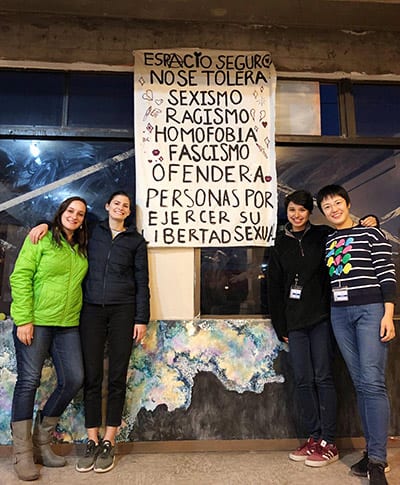
By Andrew Cohen
For most law students, winter break offers a welcome chance to relax. But for 10 Berkeley Law students, it meant a trip to Mexico to provide pro bono help to members of the migrant caravan seeking asylum in the United States.
Supervised by a legal services nonprofit, Deborah Choi ’20, Monica Ramsy ’19, Isaac Flegel-Mishlove ’21, Lee Ann Felder-Heim ’21, Sophie Allaert LL.M. ’19, and Oscar Sarabia Roman ’21 worked in Tijuana from December 18-23. Kiki Tapiero ’20, Amanda Miller ’20, Ying Jiang LL.M. ’19, and Maddie Boyd ’19 followed from December 28-January 4.
The students were drawn to Mexico after thousands of Central American migrants and refugees arrived last month in Tijuana, just south of California, hoping to gain asylum into the United States. The migrants’ prospects dimmed with the December 20 announcement by the U.S. and Mexican governments that they must wait in Mexico while their cases are reviewed—a process that routinely lasts more than a year.
Berkeley Law’s Pro Bono Program sponsored the trips after students approached Director Deborah Schlosberg.
“This trip originated out of student interest,” Schlosberg says. “We felt like this work was a response to a humanitarian emergency, and we wanted to support our students in doing the work.”
Students helped put on know-your-rights training and legal orientation workshops, and also provided direct legal services and conducted client intakes.
Miller helped spread the word about the need for volunteers at the border, and Tapiero, co-leader of the Berkeley Immigration Group, emailed members to gauge interest.

“This trip was a priority for me because I didn’t just want to be a bystander to the humanitarian crisis happening at the border,” Tapiero says. “When Amanda emailed me informally about a call for volunteers, I did everything I could to make the trip a reality and to involve other students who might also be interested.”
A call to action
For students, their time in Mexico reinforced the importance of engaging with urgent issues outside an academic bubble—and countering the notion that law students need to take a hiatus from community involvement.
Having worked for several years in migration justice before enrolling at Berkeley Law, Flegel-Mishlove says “it felt particularly frustrating during the first semester to watch the developing human rights catastrophe along the border from afar, and not be able to give any support.”
Students noted that the privilege of receiving a top legal education carries with it a responsibility to use their training to address social injustices.
“I’m deeply appreciative of the student leaders who poured their time and energy into putting the trip together, and right in the middle of finals,” Flegel-Mishlove says. “I also appreciate Berkeley Law’s Pro Bono Program for enthusiastically supporting and financially backing this immense student effort.”
The caravan traveled from Honduras through Guatemala and Mexico to Tijuana, prompting President Trump to send thousands of troops to the border. But the group has since dwindled in size. Many have returned to Central America or settled in Mexico, which issued humanitarian visas to about 3,000 people.
Now, amid the ongoing U.S. government shutdown over the border-wall funding dispute, a new wave of Central Americans is traveling to the border. The group reportedly includes many families with children and children traveling without parents.
For many of the Berkeley Law students involved, seeing the border crisis first-hand resonated in powerful ways. Now back at school, Tapiero is working to raise funds and find other ways to support the organization with whom the students worked.
“This issue is especially personal to me because my father is an immigrant, and many of my experiences growing up with other immigrant families have motivated me to want to become an immigration lawyer,” she says.